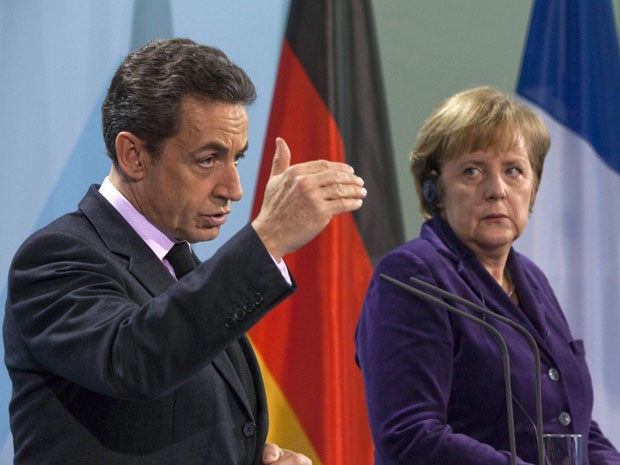Your support helps us to tell the story
From reproductive rights to climate change to Big Tech, The Independent is on the ground when the story is developing. Whether it's investigating the financials of Elon Musk's pro-Trump PAC or producing our latest documentary, 'The A Word', which shines a light on the American women fighting for reproductive rights, we know how important it is to parse out the facts from the messaging.
At such a critical moment in US history, we need reporters on the ground. Your donation allows us to keep sending journalists to speak to both sides of the story.
The Independent is trusted by Americans across the entire political spectrum. And unlike many other quality news outlets, we choose not to lock Americans out of our reporting and analysis with paywalls. We believe quality journalism should be available to everyone, paid for by those who can afford it.
Your support makes all the difference.France and Germany have said boosting economic growth across Europe was a priority in their efforts to stem the debt crisis that is showing signs of spreading across the 17 euro currency countries.
Following a meeting in Berlin with French President Nicolas Sarkozy, German Chancellor Angela Merkel also urged Greece and its private creditors to quickly agree the restructuring of the country's national debt if it is to receive its next batch of bailout cash.
In October the eurozone agreed a second handout for Greece that involves the country's private creditors accepting a 50% reduction in the value of their holdings of Greek debt.
She added that both she and Mr Sarkozy want Greece to receive the money.
"We want for Greece to remain in the eurozone," she said.
The two leaders also said they would consider speeding up payments into the 17-nation eurozone's permanent rescue fund, the European Stability Mechanism, in an effort to bolster confidence, and for a quick conclusion to negotiations on a new treaty enshrining fiscal rules.
Germany has insisted on austerity measures in the so-called eurozone's fight to lower budget deficits and regain investor confidence. Europe is working to hammer out a new treaty enshrining tougher fiscal rules, which leaders agreed at a summit in early December.
Mrs Merkel added that resolving the crisis will be "step-by-step ... there's no single-dimension solution."
They also said that Europe should compare countries' labour market practices and learn from the best, and for European funds to be used in a way that could create jobs.
The French and German leaders are working to draw up new budget and fiscal guidelines by March to help contain a debt crisis that threatens to engulf the eurozone.
Greece, whose sovereign debt problems sparked the current crisis, is struggling top impose austerity measures to ensure that it secures a second bailout to ensure that it does not default on its debt and remain in eurozone.
Greek Prime Minister Lucas Papademos warned union leaders and business groups last week that decisions made in the next few weeks, ahead of a new visit by international debt inspectors, will determine the country's future in Europe.
Greece is also working to strike a deal with creditors for the 50% reduction in their holdings of Greek debt to try to put the country back on its feet.
Mrs Merkel and Mr Sarkozy will travel to Italy on January 20 before a European summit at the end of the month.
Italy is a key focus of the crisis because of its size, huge debt load and need to borrow heavily in the first quarter. The yield on its 10-year bonds is hovering around the 7% level that is widely-considered to be a danger mark.
The push to secure a future for the eurozone comes amid hopes that some parts of Europe might avoid a recession this year.

Join our commenting forum
Join thought-provoking conversations, follow other Independent readers and see their replies
Comments